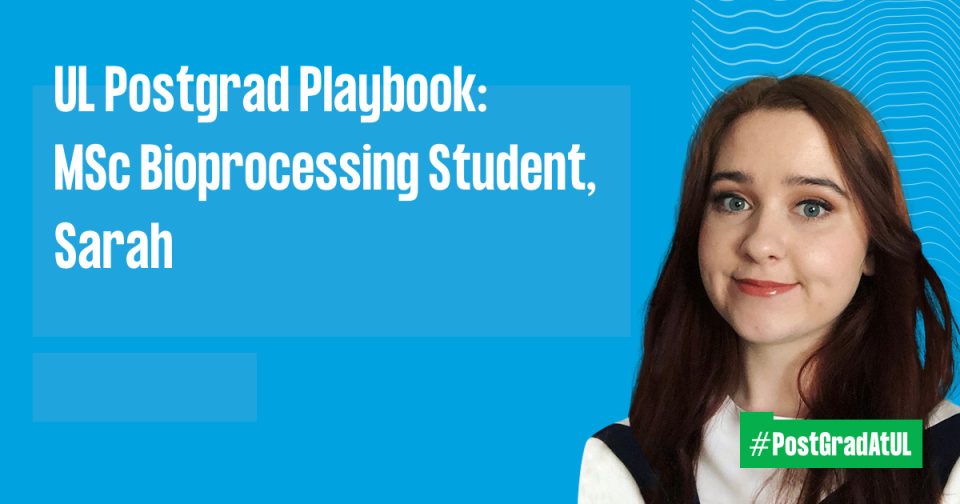
My name is Sarah and I’m studying Bioprocessing at the University of Limerick. After completing my BSc in Industrial Biochemistry at UL, I decided to pursue a science postgraduate course - the MSc in Bioprocessing. I chose to undertake this postgraduate degree because I wanted to build upon the practical and academic knowledge I gained during my undergrad. I knew from my experience at UL that the facilities and lecturers were excellent, and I felt in order to perform to the best of my ability in the workforce, a master’s qualification would be pivotal.
Gaining real-world experience and industry connections
When researching master’s programmes across Ireland, there were two key elements I was looking for – the opportunity to gain valuable work experience in industry and having a competitive edge in the job market upon completion of the programme. I wanted a course that would further equip me with specialised skills. While in my undergrad I was fortunate to spend time in a co-operative education placement where I saw a great increase in my practical work skills. The opportunity to go on placement in this MSc is the main reason I wanted to do the course. Competing Masters included business modules which I did not feel my talents were best suited to. Furthermore, UL has strong scientific research institutes, and it was important for me to make connections in Industry.
Doing this master’s programme really has been a great networking opportunity for me. A significant portion of the students in my course are currently working in Industry at the moment and I now know at least one person working in most of the major pharmaceutical companies in Ireland. There is also the option of carrying out the ‘Summer Project’ through an industry placement, which is another excellent networking opportunity as many UL graduates acquire job offers from their placement employer.
Building new skills, teamwork and independent learning
Many of the modules in my course are assessed through group work and presentations, which has allowed me to develop many transferrable work-related skills. Teamwork is crucial in the workplace and working on a variety of group projects with people from different academic backgrounds and cultures is allowing me to develop my communication and problem-solving skills. The ability to give a strong presentation is extremely important, and I found my presentation skills improved immensely after giving several presentations individually and as part of a group during this programme. Of course, it’s not all group work, and the reports and projects that I had to carry out on an individual basis allowed me to further develop my problem solving and research skills. Several of the modules require independent learning and it was a good opportunity to take responsibility for my own learning and development.
Studying new trends and emerging technologies in bioprocessing
I have also had the opportunity to develop many computer skills in this course - specifically, experience using molecular modelling software and data analytics tools to construct and analyse models of biological structures through computer based practicals. I have also learned how to use flowsheeting software to design upstream and downstream processes and to perform process analysis and economic evaluations. I was able to develop my knowledge on new trends and emerging technologies in bioprocessing too.
The small class size encourages discussions between students and the lecturers and supports an interactive learning environment. I am also greatly improving my writing skills through the ‘Scientific Communication and Literature Review’ module.
What to expect from an MSc in Bioprocessing at UL?
UL offers a number of supports to postgraduate students. When I first applied for this MSc in Bioprocessing, I had many questions about the course and the Course Director was extremely helpful in answering my queries. The UL Careers Division offers several useful services like CV clinics and practice interviews that I utilised during my undergrad and intend to use again during this MSc before I graduate. Doing this MSc has definitely enriched my career prospects, I am more confident in my work and academic skills and feel more prepared for the working world than I did after completing my undergraduate degree.
Advance your career in Science and Engineering
Read more about what a science postgraduate course at UL can offer you. Download your eBook and discover the many postgraduate course options offered, hear from course leaders and other graduates.